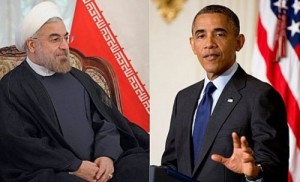 Monday, March 03, 2014 - For the Iran, the most important question is whether to dismantle its nuclear installations, the way then Libyan leader Muammar Gaddafi did in December 2003. Owing to prolonged economic and military sanctions, Gaddafi unilaterally announced on December 19, 2003, that, “Libya would voluntarily eliminate all materials, equipment and programs that could lead to internationally proscribed weapons, including weapons of mass destruction and long-range ballistic missiles.”
Monday, March 03, 2014 - For the Iran, the most important question is whether to dismantle its nuclear installations, the way then Libyan leader Muammar Gaddafi did in December 2003. Owing to prolonged economic and military sanctions, Gaddafi unilaterally announced on December 19, 2003, that, “Libya would voluntarily eliminate all materials, equipment and programs that could lead to internationally proscribed weapons, including weapons of mass destruction and long-range ballistic missiles.”
Today United States and other countries (P5+1) would definitely persuade the Iran to dismantle its nuclear facilities to the satisfaction of these powers and IAEA. Nevertheless, most significant would be the satisfaction of Israel. Israel would like to prevail upon US to ensure that, this Jewish State is totally secured from the Iranian nuclear and missile programme. Otherwise, Arabs and particularly GCC countries has no visible threat from the Iranian nuclearprogramme.
For the Iran however, there are two models. The first is the Libyan model, where upon dismantling of its nuclear facilities and WMD, US and Western powers created and fuelled insurgency and finally eliminated the Gaddafi regime. Libya is still unstable and there is ethnic war going on for the domination on the central power. In no case, the Libyan got anything worth, following the foreign intervention in 2011. The other model, Iran has for consideration is the North Korean one. Despite many odds and US pressure, North Korea could explode its nuclear weapons and today is a defecto-nuclear state, with at least over a dozen nuclear devices. Neither U.S nor its strategic allies in East Asia; South Korea and Japan could do much against North Korea. Rather, regional allies of the US are threatened from the North Korea. Upon the NATO and USintervention in Libya in 2011, then North Korean Foreign Minister issued a statement that, had Libya not dismantle its nuclear programme, it could not have been invaded and Gaddafi killed through humiliation.
Though, Iran agreed for the cessation of its nuclear programme during the interim deal, reached between P5+1 and Iran on February 18, 2014, however, until the implementation phase (July 2014), nothing is clear. Analysts of international relations feel that, “stipulations from both sides might make a final settlement impossible.” This is in view that, United States and other members are insisting Iran to dismantle its nuclear programme, partly or wholly; at least the parts of Iranian nuclear programme, dealing with weapon grade Uranium enrichment. Besides, Iran is also expected to bring on the negotiating table its; heavy-water reactor project, nuclear military research and ballistic missile programme. Iran, however still maintains that, only its nuclearprogramme will be discussed, not even its dismantling. Surely, it would be for the discussion for modernizing it and indeed, for making its exclusive use for the peaceful use of nuclear energy.
The likely deal would include; a civilian nuclear programme for Iran and measures like; limiting the level of enrichment and stockpiles of enriched uranium, dismantling of centrifuges and possibly the heavy-water reactor, which produces plutonium and finally, all will be subjected to inspection by IAEA. How far Iranian leadership especially the Supreme Leader and the Army of the Guardians of the Islamic Revolution; Revolutionary Guards would concede these demands. It is said that, Iranian Revolutionary Guards, are the real protectors of the Iranian nuclearprogramme. They would not compromise on the military aspects of the Iranian nuclearprogramme. Indeed, it would be a great deterrent against Israel and may be any external power. There already appeared some cracks on the within Iranian larger establishment.
For the United States, it is going to be a trying deal. Brokering a nuclear deal with Iran is very important for the US national interest. But, would the super power is going to balance its relations with some of its regional allies, who may not be happy with the deal, followed by Iran-US close collaboration. Whereas regional countries like; Saudi Arabia and GCC have many reservations, countries like China and Russia would be the net losers. U.S collaboration with Iran would mean total US domination in the regional politics. For the time being, the GCC and other Middle Eastern countries may look around to find new alliances, but, the reality is that, neither China nor Russia is in a position to act as a force against the unmatched US power. Then, there are US bases in the region with sufficient military power, where US naval and strategic assets are the real deterrent against any external or internal power.
Despite odds, in case, the deal is finalized between US and Iran, the Middle Eastern region, will witness a transition, indeed, a reversal of the old order. The old partnership of Pre-Revolution will be revived and Super power would practically have no adversary in the region. Whereas, US would secure its national interest, a step further towards global imperialism, Iran would gain much more. This isolationist country would consolidate its gains in Lebanon, Syria, Gaza (Palestine) and Shia populated areas of Saudi Arabia and all other Sunni monarchs; otherwise struggling to survive their kingdoms, against the odds of domestic unrest. With US at its back, Iran would easily implement its larger agenda in the region, including proliferation of its ideology in the largerMiddle East. Perhaps, the Saudi Arabia and GCC states are scared of the same consequences upon finalization of a deal.
By Pakistan Observer
The Iran Project is not responsible for the content of quoted articles.

 QR code
QR code